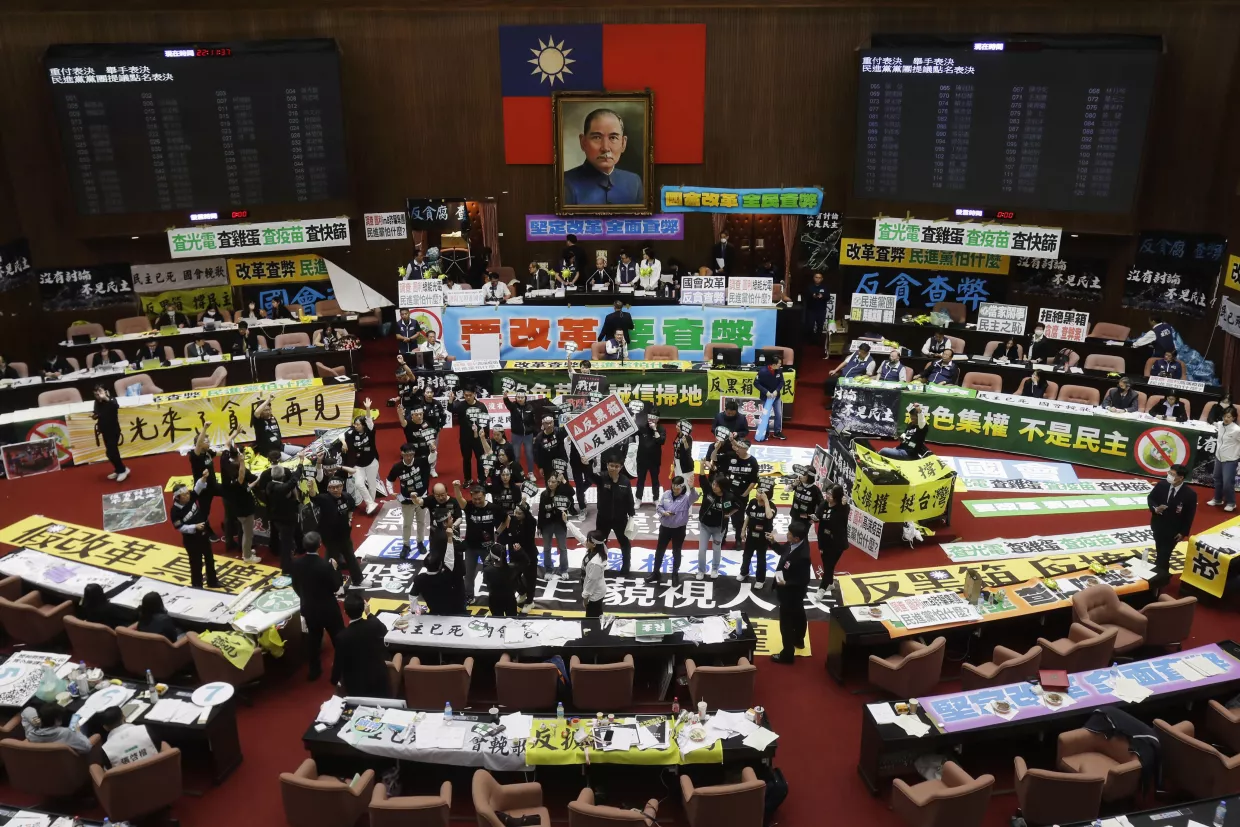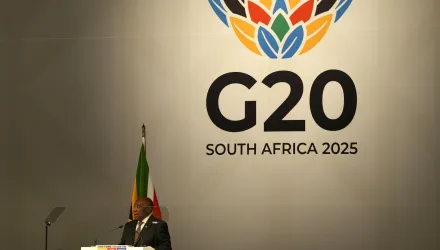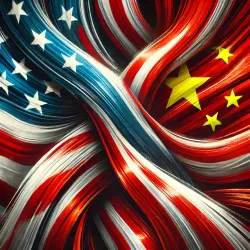- Against rising Chinese power, Taiwan finds it hard to build up deterrent capabilities because of uncertainty over the U.S. commitment to defend it. Taiwan’s domestic polarization between the ruling and opposition camps, which are respectively more and less confrontational toward Beijing, is often neglected in the U.S. but is just as important.
- The Trump administration’s commitment to getting Taiwan to spend more on defense may break this impasse by forcing more public debate in Taiwan over how much the nation should prioritize defense. But it also risks deepening Taiwan’s skepticism of U.S. resolve.
- A solution that may satisfy both the ruling and opposition camps in Taiwan is increasing defense spending (favored by the president) while also offering Beijing more rhetorical concessions (favored by the opposition). This could strengthen deterrence by helping Taiwan’s president build national support for a stronger defense policy – which requires the opposition’s buy-in – while also sending a signal to Beijing that the status quo is politically acceptable.
Taiwan is on a precarious path. In recent years, China’s threats to annex the island by force, combined with military drills displaying its growing strength, have become routine under Chinese Communist Party General Secretary Xi Jinping. Equally concerning for the status quo is Taiwan’s shift in preferences toward independence and away from unification with China—a trend that likely worries Xi and raises the risk that he might use force to address this top CCP priority. While Americans are invested in a free and prosperous Taiwan, U.S. support has its limits, and President Trump may adopt a different approach than his predecessor toward backing it. In this uncertainty, Taiwan must take steps to build a sense of urgency at home and defuse tensions across the strait.
Taiwan’s leaders already know that they must tread carefully. Although President Lai Ching-te pushed back firmly against China’s claims to Taiwan in his October speech marking the 113th anniversary of the Republic of China, given his pro-independence convictions, his remarks were quite measured.1 China’s GDP is more than 20 times the size of Taiwan’s (and grows substantially faster).2 Its population is over 60 times larger and its military spending nearly 12 times larger.3 To dissuade a much bigger China from blockading, bombing, or invading Taiwan into submission requires not only threats of military resistance but also economic leverage. Taiwan famously maintains a near-monopoly on the manufacture of advanced semiconductors, meaning a Chinese attack may cripple a key global commodity.4
Yet if Beijing chose to escalate to war, Taipei would not be able to break a Chinese blockade or repel amphibious attacks on its own but would have to rely on the United States. The uncertainty of U.S. resolve thus poses massive risks for Taiwan. Even if U.S. and Taiwan forces could beat back China’s attacks, an all-out war would be extremely costly for the U.S. military and likely cost the global economy trillions of dollars.5 China may also reconstitute its forces faster than the U.S. and try again, leading to more U.S. losses. For these reasons, many in Taiwan worry that Washington would sit out a crisis, paving the way for China to achieve its goals.6 These fears grow when considering that the U.S. may judge it can defend its top interests in Asia – Japan, Korea, and international seaborne trade – without protecting Taiwan’s sovereignty.7 A recent Chicago Council on Global Affairs survey found that, as of 2024, just over a third of the U.S. public supports sending U.S. forces to break a Chinese blockade of Taiwan or to fight off a Chinese invasion.8
Nor has the U.S. election solved Taiwan’s problems. While President Trump will not share the Biden administration’s commitment to continue aiding Ukraine, which detracts somewhat from the U.S. “pivot to Asia,” and his statements consistently indicate an inclination to focus more on Asia than Europe, he will nevertheless inject doubt into U.S. resolve.9 His questioning of Taiwan’s value, his advisors’ statements underscoring America’s limited will to defend Taiwan10, and his recent promise of tariffs on Taiwanese-made chips will likely create concern in Taipei.11
Risks for Taiwan are also growing because of trends that make it likelier Xi deems peaceful unification out of reach. Taiwan’s population will likely continue identifying more as Taiwanese, as opposed to Chinese, and grow more suspicious of unification with China as older citizens are increasingly replaced by ones formatively impacted by China’s repression of Hong Kong.12 Using Coast Guard ships to impose a blockade on Taiwan, as China practiced during last year’s Joint Sword exercises, is a dangerous option because it may prove too limited to provoke a U.S. response.13
So, Taipei must focus on dissuading Beijing from using force and strengthening its domestic resilience. Over the next ten to 15 years – likely the remainder of Xi’s tenure – Taiwan’s leaders must foster a strong sense of national pride that unites citizens behind increased defense spending and military enlistment without signaling a move toward formal independence. Painting vivid scenarios highlighting potential threats to Taiwan’s sovereignty while tiptoeing around Taiwan’s final political status can help strike this balance. Reminding the public that Chinese forces could one day block critical imports or exports, or even roll up Taiwan’s beaches, could emphasize the necessity of collective defense. The TV show “Zero Day” about a Chinese attack, which airs this May in Taiwan, seems like a good way to do this.14

However, given the show’s endorsement by the ruling party and Taiwan’s deep political polarization (see the recent defense budget dispute in parliament), it is unlikely to resonate across partisan lines.15 The prospect of greater pressure from the Trump administration on Taiwan to buy more of the right kinds of weapons and perhaps “pay us for defense”16– something politically unthinkable for a Democrat in the current climate – may get closer to a unifying message for Taiwan, as the call to take defense more seriously will be coming from a foreigner whose good grace is valued by both of Taiwan’s major parties.17
Real pressure from a new administration with more political latitude risks fueling the sentiment in Taiwan that any policy of strength is futile, confirming the fears of “U.S. skeptics” in the opposition.18 But it may also be the only hope to unite Taiwan’s polarized parties – to convince opposition hardliners that they cannot slow down Taiwan’s defense buildup without consequences and the ruling party that it should not pair pro-independence rhetoric with inadequate preparation.19 If Washington pursues a pressure strategy and U.S.-skeptics in Taiwan advocate closer ties with Beijing as a result, Trump may take it as a sign that Taipei was never a worthy partner anyway.
Listening to Washington and underscoring the military threat from China will carry its own risks for Taipei, which remains hesitant to inflame a politically polarized public with substantial defense spending and investment increases – especially without formal U.S. security guarantees.20 But such an approach would be just the second half of Theodore Roosevelt’s injunction to “speak softly and carry a big stick.” Taipei should also consider trying (through backchannels) to reinstate official dialogue with Beijing in exchange for restraint on pro-independence statements.21 This could help seed doubt in the CCP – even if not in Xi’s mind, in the minds of advisors or future leaders – that unification by force is necessary. Instead, Taipei could plausibly remain a culturally Chinese, autonomous entity in Beijing’s imperial concept of a world with the Middle Kingdom at the center, wary of China’s neurosis about Taiwan independence and content to continue humbly succeeding as the world’s only Chinese-speaking democracy.
Again, such a plan only works if military force looks unappealing – if Taipei presents a credible threat of steadfast military resistance. This can work even if Taipei’s military remains insufficient for resisting Chinese forces on its own. For as long as Taiwan does not submit quickly to a Chinese blockade, the U.S. could send it food and medicine, daring Beijing to interdict purely civilian aid.22 A promise to Beijing that final control of Taiwan would also require bloody amphibious assaults and grueling urban warfare would then impinge on China’s other priorities, namely its image in the developing world and economic growth at home.23 These considerations would make force especially unappetizing for China as long as its planned and politicized economy continues to produce fiscal crises that absorb its leaders’ attention.24
Taipei must remind its public that war is a real possibility while accounting for political divisions at home and Beijing’s concerns about Taiwan’s political status. While public messaging and backroom diplomacy may not grab headlines like high-profile arms sales or military exercises, they are perhaps Taiwan’s best tools to buy time and keep the peace. Such costly steps are probably not the Lai government’s first choice. But with Trump back in office and his advisors more committed to his foreign policy vision than in the first term, that could easily change.
Kessler, Ethan and Dennis L. Weng . “Taiwan’s Path to Security.” February 6, 2025
- David Sacks, “Reading Lai Ching-te’s National Day Speech and Its Implications for Cross-Strait Relations,” Council on Foreign Relations, October 11, 2024, https://www.cfr.org/blog/reading-lai-ching-tes-national-day-speech-and-its-implications-cross-strait-relations.
- “GDP, current prices (People’s Republic of China),” International Monetary Fund, https://www.imf.org/external/datamapper/NGDPD@WEO/TWN/CHN; “Real GDP growth (People’s Republic of China and Taiwan, Province of China),” International Monetary Fund, https://www.imf.org/external/datamapper/NGDP_RPCH@WEO/ADVEC/WEOWORLD/TWN/CHN.
- “Population, total (China),” World Bank, https://data.worldbank.org/indicator/SP.POP.TOTL?locations=CN; “Total Population,” National Statistics Republic of China (Taiwan), https://eng.stat.gov.tw/Point.aspx?sid=t.9&n=4208&sms=11713; U.S. Department of Defense, Military and Security Developments Involving the People’s Republic of China, December 18, 2024, p. 131, https://media.defense.gov/2024/Dec/18/2003615520/-1/-1/0/MILITARY-AND-SECURITY-DEVELOPMENTS-INVOLVING-THE-PEOPLES-REPUBLIC-OF-CHINA-2024.PDF.
- Lin Jones and Sarah Krulikowski, “Taiwan—The Silicon Island,” U.S. International Trade Commission, February 2024, https://www.usitc.gov/publications/332/executive_briefings/ebot_silicon_island_taiwan_semiconductor.pdf.
- Mark F. Cancian, Matthew Cancian, and Eric Heginbotham, “The First Battle of the Next War: Wargaming a Chinese Invasion of Taiwan,” Center for Strategic and International Studies, January 9, 2023, https://www.csis.org/analysis/first-battle-next-war-wargaming-chinese-invasion-taiwan; Jennifer Welch, Jenny Leonard, Maeva Cousin, Gerard DiPippo, and Tom Orlik, “Xi, Biden and the $10 Trillion Cost of War Over Taiwan,” Bloomberg, January 9, 2024, https://www.bloomberg.com/news/features/2024-01-09/if-china-invades-taiwan-it-would-cost-world-economy-10-trillion.
- “Most Taiwanese would defend island against China, poll finds,” DW News, October 9, 2024, https://www.dw.com/en/most-taiwanese-would-defend-island-against-china-poll-finds/a-70440750.
- Jonathan D. Caverley, “The Taiwan Fallacy,” Foreign Affairs, August 7, 2024, https://www.foreignaffairs.com/taiwan/taiwan-fallacy. See also the views on U.S. strategy in Asia laid out by Undersecretary of Defense for Policy nominee Elbridge Colby in his book The Strategy of Denial: American Defense in an Era of Great-Power Conflict (New Haven, Conn.: Yale University Press, 2021), esp. chap. 4, “Defining the Defense Perimeter.”
- Craig Kafura, Dina Smeltz, Jordan Tama, and Joshua Busby, “Republican Foreign Policy Experts Signal Strong Support for Taiwan,” Chicago Council on Global Affairs, February 6, 2025, p. 6, https://globalaffairs.org/research/public-opinion-survey/republican-foreign-policy-experts-signal-strong-support-taiwan.
- Alex Velez-Green and Robert Peters, “The Prioritization Imperative: A Strategy to Defend America’s Interests in a More Dangerous World,” Heritage Foundation, August 1, 2024, https://www.heritage.org/defense/report/the-prioritization-imperative-strategy-defend-americas-interests-more-dangerous; Maya Mehrara, “Donald Trump's '100 Day' Ukraine Peace Plan Leaked: Report,” Newsweek, January 27, 2025, https://www.newsweek.com/donald-trumps-100-day-ukraine-peace-plan-leaked-report-2021215; Michael Poznasky, “The Ukraine-Taiwan Tradeoff,” Foreign Affairs, January 5, 2024, https://www.foreignaffairs.com/china/ukraine-taiwan-tradeoff.
- John Bolton, “The Scandal of Trump’s China Policy,” Wall Street Journal, June 17, 2020, https://www.wsj.com/articles/john-bolton-the-scandal-of-trumps-china-policy-11592419564; Michael Anton, “Why It’s Clearly Not In America’s Interest To Go To War Over Taiwan,” The Federalist, December 20, 2021, https://thefederalist.com/2021/12/20/why-its-clearly-not-in-americas-interest-to-go-to-war-over-taiwan/; Elbridge Colby, “The U.S. and Taiwan Must Change Course,” Wall Street Journal, September 2, 2024, https://www.wsj.com/opinion/us-taiwan-china-defense-elbridge-colby-64ef679c; Elbridge Colby, “Taiwan must get serious on defense,” Taipei Times, May 11, 2024, https://www.taipeitimes.com/News/editorials/archives/2024/05/11/2003817679; Keoni Everington, “Petition urges Rubio to remove Darren Beattie for disparaging Taiwan,” Taiwan News, February 4, 2025, https://www.taiwannews.com.tw/news/6029297.
- “Taiwan to hold emergency discussions after Trump pledges tariffs on chips,” Focus Taiwan, January 29, 2025, https://focustaiwan.tw/business/202501290004.
- “Taiwanese / Chinese Identity(1992/06~2024/12),” Election Study Center, National Chengchi University, January 13, 2025, https://esc.nccu.edu.tw/PageDoc/Detail?fid=7800&id=6961; “Taiwan Independence vs. Unification with the Mainland(1994/12~2024/12),” Election Study Center, National Chengchi University, January 13, 2025, https://esc.nccu.edu.tw/PageDoc/Detail?fid=7801&id=6963.
- Dzirhan Mahadzir, “China Targets Taiwan in Major Military Exercise, Pentagon Condemns ‘Irresponsible’ Action,” U.S. Naval Institute News, October 14, 2024, https://news.usni.org/2024/10/14/china-targets-taiwan-in-major-military-exercise-pentagon-condemns-irresponsible-action; Bonny Lin, Brian Hart, Chen Ming-Chi, Shen Ming-Shih, Samantha Lu, Truly Tinsley, and Yu-Jie (Grace) Liao, “Surveying the Experts: U.S. and Taiwan Views on China's Approach to Taiwan,” Center for Strategic and International Studies, January 22, 2024, p. 18, https://www.csis.org/analysis/surveying-experts-us-and-taiwan-views-chinas-approach-taiwan.
- Chris Buckley and Amy Chang Chien, “What if China Invades? For Taiwan, a TV Show Raises Tough Questions,” New York Times, August 25, 2024, https://www.nytimes.com/2024/08/25/world/asia/china-taiwan-zero-day-tv-show.html.
- Eric Cheung and Will Ripley, “Taiwan’s divided politics undermine defense resolve as Trump returns,” CNN, January 24, 2025, https://www.cnn.com/2025/01/24/asia/taiwans-budget-freeze-defense-trump-intl-hnk/index.html; “《零日攻击》:“武统”台湾主题的战争剧为何引发激烈辩论?” BBC News (Chinese), August 27, 2024, https://www.bbc.com/zhongwen/simp/chinese-news-69299138.
- “The Donald Trump Interview Transcript,” Bloomberg Businessweek, July 16, 2024, https://www.bloomberg.com/features/2024-trump-interview-transcript.
- David Sacks, “Would Trump abandon Taiwan?” East Asia Forum, October 14, 2024, https://eastasiaforum.org/2024/10/14/would-trump-abandon-taiwan/. On asymmetric concepts and systems, see Chap. 9: Taiwan, in U.S.-China Economic and Security Review Commission, 2024 Annual Report to Congress, pp. 634-642, https://www.uscc.gov/sites/default/files/2024-11/Chapter_9--Taiwan.pdf.
- Ogasawara Yoshiyuki, “‘Skepticism about the U.S.’ Spreading in Taiwan,” Discuss Japan, March 14, 2023, https://www.japanpolicyforum.jp/diplomacy/pt2023031420052012992.html.
- Kelvin Chen, “Opposition budget cuts to Taiwan's defense increase risk of cross-strait conflict,” Taiwan News, January 27, 2025, https://www.taiwannews.com.tw/news/6024393.
- Bethany Allen-Ebrahimian, “View from Taiwan: KMT frames 2024 election as a choice between war and peace,” Axios, May 23, 2023, https://www.axios.com/2023/05/23/taiwan-kmt-frames-2024-election-choice-between-war-peace; Raymond Kuo, “‘Strategic Ambiguity’ Has the U.S. and Taiwan Trapped,” Foreign Policy, January 18, 2023, https://foreignpolicy.com/2023/01/18/taiwan-us-china-strategic-ambiguity-military-strategy-asymmetric-defense-invasion/.
- “The Widening Schism across the Taiwan Strait,” International Crisis Group, September 26, 2024, https://www.crisisgroup.org/asia/north-east-asia/taiwan-strait-china/342-widening-schism-across-taiwan-strait.
- Thank you to Naveen Krishnan for highlighting this point. See also Dr. Steven Wills, “Blockade the Belt and Road or Taipei Airlift?” Navy League of the United States, https://www.navyleague.org/programs/center-for-maritime-strategy/the-moc-blockade-the-belt-or-taipei-airlift/.
- “China’s Approach to Global Governance,” Council on Foreign Relations, https://www.cfr.org/china-global-governance/.
- Michael Pettis, “Why Is It So Hard for China to Boost Domestic Demand?” Carnegie Endowment for International Peace, July 31, 2024, https://carnegieendowment.org/posts/2024/07/why-is-it-so-hard-for-china-to-boost-domestic-demand?lang=en; Chun Han Wong, “Xi Tells Officials Scared of Being Purged: It’s OK to Make Mistakes,” Wall Street Journal, January 19, 2025, https://www.wsj.com/world/china/china-xi-jinping-government-purge-approach-87e25bcf.






